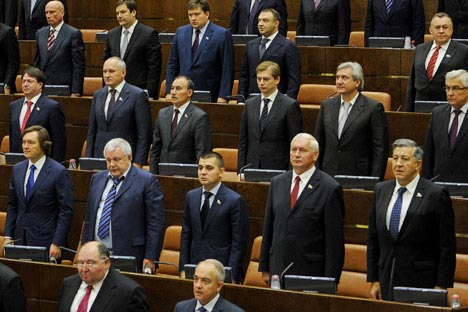|
 Russian officials will have to be accountable not only for their personal spending, but also for the spending of their spouses and underage children. (Agencies) |
|
President Vladimir Putin signed a set of bills introducing controls on personal spending by government officials. According to the new law, the controls will apply to “purchases of land or other real estate property, vehicles, securities and stocks, if their amount exceeds the income of the purchaser and his or her spouse for the three years immediately preceding the transaction.” Officials will have to declare not only their own spending, but also the spending of their spouses and underage children. The source of funds for the acquisition of any property will need to be justified. Failing to do so will result in the official being fired and the property confiscated. The law also introduces criminal liability for failure to pay a fine that is envisaged as the main punishment for officials unable to prove the legality of their property acquisition. Penalties include house arrest or community service, with no jail time stipulated in this case. The new provisions will go into effect on January 1, 2013, and they will apply to transactions entered into in 2012. When filing tax returns in April 2013, officials will have to declare not only their 2012 income, as usual, but also their expenses during that period. The new law will apply to parliament deputies, senators, government ministers and regional and municipal officials, as well as to Central Bank and Pension Fund employees. According to Vladimir Vasilyev, deputy Duma speaker and head of the United Russia faction in the Duma, the amendments will affect almost 10 million people. The government’s representative at federal courts, Mikhail Barshchevsky, estimates that, to control the spending of 10 million officials, the government will need to set up a special department with a staff of at least 300,000 people. “The number of officials falling under this law should be cut to at least 100,000; the law should apply only to ministers, governors, police chiefs, chief judges and prosecutors,” Barshchevsky told Ekho Moskvy radio. “If a governor and a vice-governor are not corrupt, they’ll make sure that department heads don’t embezzle money. They won’t allow their subordinates to be stealing and living richer lives than them,” the government representative said. Barshchevsky also noted that officials already declare their property, along with their incomes. “You can see what property an official has bought in the past year, if you compare their property and income reports for the past two years,” Barshchevsky said. (Read by Brian Salter. Brian Salter is a journalist at the China Daily Website.) (Agencies) |
俄羅斯總統(tǒng)弗拉基米爾?普京簽署了一系列控制政府官員個人消費的法案。根據(jù)新法規(guī),“如果官員購買土地或其他房產(chǎn)、汽車、證券和股票的消費額超過購買者和其配偶前三年的總收入”,將對其實行消費控制。 官員不但要申報自己的消費額,還要申報配偶及未成年子女的消費額。官員需要證明自己所購任何資產(chǎn)的資金來源為合法。如果做不到,官員就會被撤職,資產(chǎn)被充公。 對于那些無法證明資產(chǎn)購買合法性而又沒有繳納作為主要懲罰的罰金的官員,該法規(guī)將對其追究刑事責(zé)任。處罰包括軟禁或社區(qū)服務(wù),但沒有規(guī)定監(jiān)禁時間。 新法規(guī)將于2013年1月1日生效,對于2012年發(fā)生的交易也同樣有效力。當(dāng)2013年4月進行納稅申報時,官員不但必須像往年那樣申報他們2012年度的收入,還須申報這一年度的消費明細。 這一新法規(guī)將應(yīng)用于國會議員、參議員、政府部長、地方和市政官員,以及中央銀行和養(yǎng)老基金會的雇員。據(jù)俄羅斯國家杜馬(下議院)代表發(fā)言人、統(tǒng)一俄羅斯黨主席弗拉基米爾?瓦西里耶夫表示,這一修正案將影響近1000萬人。 俄羅斯政府在聯(lián)邦法院的代表米哈伊爾?巴什車夫斯基估計,要對1000萬官員的消費進行控制,政府需要建立一個專門的部門,并配備至少30萬名工作人員。 巴什車夫斯基告訴莫斯科回聲電臺說:“受到這一法律制裁的官員人數(shù)應(yīng)被控制在至少10萬人以內(nèi),該法規(guī)應(yīng)該只應(yīng)用于政府部長、地方長官、警察局長、審判長和檢察官。” 這位政府代表說道:“如果省長和副省長都不貪污,他們會確保各部門主管都不侵吞公款。他們不會允許自己的下屬挪用公款、過著比自己還富有的生活。” 巴什車夫斯基還指出,官員們其實已經(jīng)申報了自己的財產(chǎn)和收入。他說:“如果你將過去兩年內(nèi)官員的財產(chǎn)和收入報告進行比較,你會看見官員在過去一年內(nèi)購置了什么產(chǎn)業(yè)。” 相關(guān)閱讀 (中國日報網(wǎng)英語點津 陳丹妮 編輯:Julie) |
|
Vocabulary: confiscate: 沒收;充公 provision: 規(guī)定;條款 |
